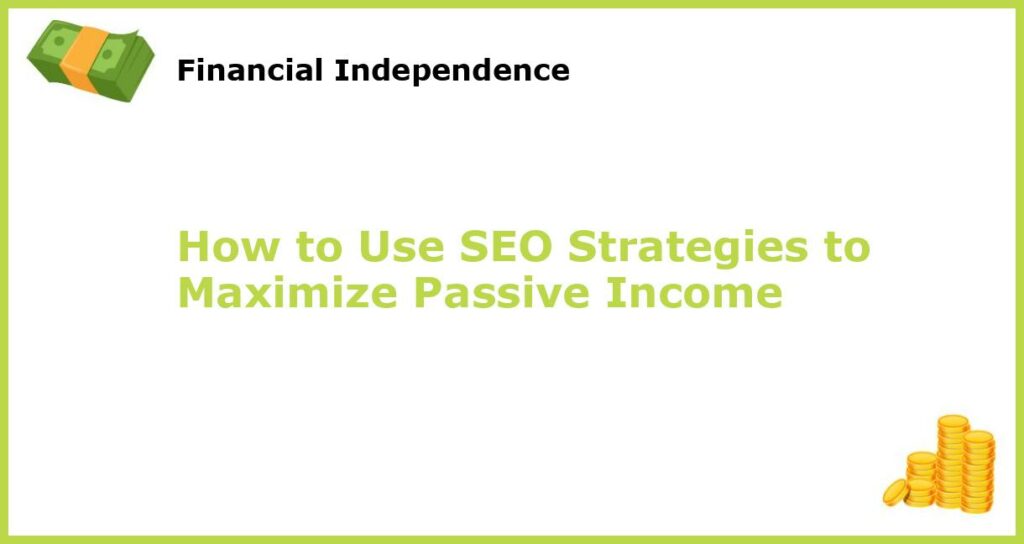If you have a website or blog, you likely want to monetize it and generate passive income. Search Engine Optimization (SEO) is a useful tool to achieve this goal. SEO involves optimizing your website to rank high in search engine results pages. To maximize passive income through SEO, follow these ten strategies:
1. Define Your Niche

The first step is to define your niche. Your niche determines the keywords and topics you should target. For example, if you are in real estate, you can focus on keywords such as “houses for sale,” “buying a home,” or “real estate development.” Defining your niche helps you identify the best keywords to target and helps to focus your content ideas. It also helps you understand what type of traffic you are attracting to your website.
2. Conduct Keyword Research

After defining your niche, conduct thorough keyword research. Keyword research entails finding appropriate keywords that are relevant to your niche and have a high search volume. To conduct keyword research, use tools such as Google Keyword Planner, SEMRush, or Ahrefs. These tools show you the search volumes and competitiveness of specific keywords. Proper keyword research helps you to develop a content strategy, and it helps ensure your keywords are targeted and effective.
3. Optimize Your Website Structure

The structure of your website is critical in maximizing passive income through SEO. Ensure your site is organized in a way that is easy for search engine crawlers to navigate. Use clear and concise URLs, and make sure you create internal links to relevant pages on your site. This helps search engines understand the hierarchy of your content and helps to raise your authority in your niche. Proper website structure and design facilitate better user experience and make your website more influential in search engine rankings.
4. Optimize Your Content

It is critical to optimize your content for both search engines and users. This involves using appropriate keywords in your headings, subheadings, and body text. Ensure your content is both informative and engaging for your audience. Additionally, use multimedia such as images, videos, or infographics to break up the text. Using videos and pictures will make your content more visually appealing, thus reducing bounce rate and increasing dwell time, two factors that search engines consider when ranking pages.
5. Monitor Your Website Performance

Monitoring website performance is essential to maximize passive income through SEO. Use tools such as Google Analytics to track your website’s traffic and identify any issues that may arise. Issues such as slow loading speeds, broken links, or incorrect indexing can hurt the performance of your website. Google Analytics also provides metrics that can help you track your website’s progress and make informed decisions. Regularly monitoring website performance helps you make necessary adjustments to ensure maximum page ranking.
6. Utilize Social Media Platforms

Social media platforms can be a great way to promote your website and increase visibility in search engine results. Create social media accounts and share your content with followers. This increases the likelihood of your content being shared and linked to, which can help to raise your website’s authority. Also, share your content in relevant Facebook groups and Twitter chats. Social media can help you improve branding, build new relationships, and enhance customer experience.
7. Build Backlinks

Backlinks are essential components of any successful SEO strategy. Backlinks are links from other websites that point towards your content. To build backlinks, create high-quality content that is relevant and informative for your audience. Reach out to other websites in your niche and request them to link to your content. Additionally, use guest posting to create backlinks to your website. Backlinks help search engines evaluate the pages it crawls and improve website authority, and page ranking.
8. Optimize for Local Search

If you target a specific geographic area, optimizing for local search is crucial. Using keywords and phrases that are relevant to your local area will drive targeted traffic to your website. For instance, if you run a coffee shop in New York, you may target keywords such as “coffee shop in New York” or “best coffee in New York.” Optimizing for local search helps you dominate local search results and attract local customers. Ensure consistency across web citations and directories, and obtain positive customer reviews on Google My Business and other local review sites.
9. Update Your Website Frequently

Regular updates to your website are another way to maximize passive income through SEO. Updating your website with high-quality content helps to demonstrate that your website is active and relevant. Consider adding a blog section to your website to provide fresh content regularly. A blog helps educate your audience and teach them more about your niche. Sharing blog posts to your audience and social media followers will also reduce your bounce rate and increase dwell time.
10. Explore Other Passive Income Streams
Maximizing passive income through SEO does not mean that you should only focus on SEO-related strategies. Explore other passive income streams, such as affiliate marketing, sponsored content, or digital product sales. Diversification helps to maximize your website’s revenue potential and reduce the impact of any changes in search engine algorithms. Branching out to other revenue streams will also help you target different segments of your audience.







